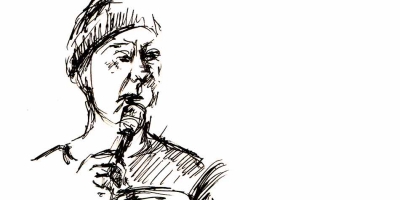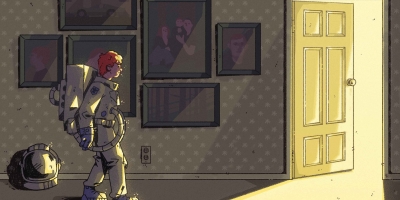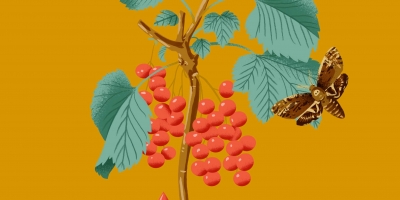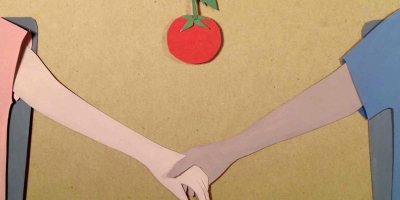Fiction
Early Girl
by J. Ryan Stradal

Most people wouldn’t suspect that the best early-growth heirloom tomatoes in North America might come from a rented second-story apartment above a yoga studio in Chicago, Illinois. That’s where Dory Bauer and her fiancé of four years, Spencer F. Dawes, scraped their knees and soiled their hands every spring of their engagement, growing Moskvich tomatoes, which, so far, they’d never eaten.
Weeks after their planting in the early spring, they would clip the maturing stems like a Bordeaux winemaker to create fewer fruits, and hence concentrate the plant’s nutrients in a lower yield—but once ripened, their entire tomato crop, about thirty pounds, was given away to a local organic soup kitchen sponsored by Grub Not Guns. Only the most perfect two Moskviches were plucked out of each harvest, and only for their seeds, which were carefully stored in glass jars in a locked, climate-controlled pantry. After nearly half a decade, Spencer and Dory had created a Moskvich tomato with uniformly unblemished flesh, a natural pest resistance, nuanced tannic structure, consistent size, and a rock-solid maturation cycle of fifty-five days.
On April thirteenth of year five, when the temperature was fifty-eight degrees and the sky was cloudy but not raining, Dory felt that it was time to plant their first harvest of Moskvich heirlooms meant for human consumption. She called in sick at the wine bar, and then phoned Spencer.
“Hey, babe, what’s up?” he said.
“Did you see what the dewpoint is today?” Dory asked.
“Yep. Time to plant?”
“It’s time.”
They selected their two most handsome Moskvich seeds and planted them in bisected brown eggshells filled with 85 percent pure Canadian topsoil from the Okanagan Valley, 5 percent fair-trade organic coffee grounds, and 10 percent their proprietary homemade mixture of human hair, fish heads, dissolved Epsom salts, molasses, spring water, and banana peels.
With the first few days being so crucial to a tomato plant’s health, it was decided that Dory would use some of her maternity-leave time to stay home with the infant plants. At first the wine bar resisted, stating that she neither had a child, nor did they offer benefits, much less maternity leave. Dory kept at it, and finally the wine bar said fine, take some time off, call it whatever you want.
It was harder for Spencer to get time off from the sake distillery, where his main job as Japanese/English translator was to prevent embarrassing copy on the packaging. He was able to use some of his accrued vacation time to ensure that the Moskviches got their recommended ten hours of darkness, but the rest was on Dory.
Once the seedlings outgrew their eggshell incubators, Spencer and Dory moved them out to their now-enclosed patio. The enclosure was a violation of their lease agreement, but tomato plants cross-pollinate with frightening alacrity, and Spencer would rather lose their security deposit than have a repeat of 2011, when he sat in a folding chair all day killing bees and small birds with an electric bug zapper shaped like a small tennis racket.
They had it all planned out. If they had a disagreement, or wanted to stream a violent movie on their MacBook, they took it to the kitchen or the bedroom; if they wanted to make love or watch a comedy, they did it on the patio by the tomato plants. It was just shy of six weeks when the first little green globes appeared.
Dory was home taking the last of her maternity leave when she read the news that the Upper Midwest Heirloom Tomato Empire had collapsed. It was an institution: five of the best heirloom tomatoes in North America were exclusively sold at the St. Paul Farmers’ Market, and now both the heirlooms and their growers were gone. For sandwiches, there had been the sliceable and stunning Caspian Pink, from Heirloom Johnny Lao, of Coates, Minnesota; for salads, the handsome Golden Dwarf Champion, from Chee Xiong, of St. Paul, Minnesota; for sauce, the prolific Stupice, from Rodgers Dubcek of Pine City, Minnesota; for paste and ketchup, the generous San Marzano, from Karen Sjoholm, of Hudson, Wisconsin; and for stuffing, the breathtaking Striped Cavern, once again from Heirloom Johnny Lao.
Under Heirloom Johnny’s leadership, no grower attempted anyone else’s tomatoes; since 1990, everyone owned a niche, mastered it, and had a duty to create the superlative expression of their particular nightshade heirloom tomato fruit and only that particular variety. Apparently, they’d had a meeting at Heirloom Johnny’s estate in Coates, where Heirloom Johnny went crazy and shot the other three growers dead. It came out later from next of kin that Chee and Karen were going to propose selling early-growth tomatoes like Moskviches, and when Johnny threatened Chee Xiong with a gun, a fight evolved and decayed in the fashion of too many fights where guns are introduced.
Bitten by grief—Dory still had a jar of Karen’s San Marzano-based ketchup in the fridge from last year’s Heirloom Fest—Dory called Spencer at work immediately after she read the news.
“Did you hear?” she asked.
“I heard. I was just about to call you.”
“What do you think?”
“I think this is what people call a window of opportunity.”
“No, I mean, about Karen and everybody.”
“Well, it’s sad,” he said, because even though he wasn’t sad—he was more shocked than sad—he could tell that she was.
“Yeah.”
“But now what? Where is Eva Thorvald going to get her tomatoes? Maybe us, maybe.”
“So what do we do next?”
“Go public, as soon as possible,” Spencer said, leaving work early and zipping home on his Masi Gran Criterium.
They knew better than to post pictures of the actual tomatoes—posting photo evidence of their Moskviches at this stage could invite disaster, in the form of jealous local Farmer’s Market competition or any number of partisan heirloom gangs—so they wrote accounts of their growing process for the tomato community, the epicurean community, and the nightshade-enthusiast community, while always lying about the plants’ actual whereabouts. The photo they posted on Facebook of just their perfected Moskvich seeds got 278 likes and 43 comments, even more than the announcement of their engagement. One of the comments was from Eva Thorvald. She wrote: “Cool beans.”
Eva Thorvald. The Eva Thorvald, who threw the most exclusive private pop-up supper club in the country and had every spot at the table reserved for the next six years, thought their tomatoes, their heirloom Moskvich tomatoes, were “cool beans.” They didn’t sleep that night. They didn’t need coffee the next day. They had sex four times in a twenty-hour period, breaking the previous record of three they had set in the first twenty hours they knew each other. Eva’s comment got 133 likes of its own. Tomato growers from all over the country emailed and texted, and two middle-aged people called on the phone, and one really old guy sent a letter, and they all said some version of EVA LOVES YOU and GO FOR IT.
They flipped a John F. Kennedy half-dollar, and Dory won, so she wrote the email to Ms. Thorvald. They got a response immediately; good things happen quickly in the world of perishables. “Sure, bring ‘em out three days before they’re fully ripe,” Eva wrote. She knew that they were farther along than they’d let on. “I’ll take a look at ‘em.”
This was not a promise; this was not a purchase. It was just an invitation. But it was an indication from Chef Eva Thorvald that their tomatoes may be considered for her kitchen, and by extension, perhaps even fit to be an ingredient in The Dinner.
Dory and Spencer spent the next few days planning the road trip. The trip from Chicago to Minneapolis could be done in as little as seven hours, but to lessen the effects of transplant shock on their plants, they decided to split it over at least two days. They felt if they drove slower, and stopped more frequently, the tomatoes would also be less susceptible to road jostling and motion sickness. Tomato plants weren’t meant to move at all, let alone from Illinois to Minnesota, and going seventy-five miles an hour on the interstate is to a Moskvich tomato what the sound barrier is to a human. Plus they wanted to have a little more time with their plants, and spread the pain of their farewell over as much time as possible.
Spencer went to work finding owner-operated bed-and-breakfasts, farm-to-table restaurants, points of interest, and an affordable van with tinted windows. The last one was the hardest, but they didn’t want any looky-loos getting a peek at their Moskvich plants before Minnesota. They also had to detach sections of trellis from their patio and practice moving the whole shebang—from the potted roots to the farthest reach of its indeterminate vine—into the van, and installed hooks on the van’s interior walls to keep the trellis sections in place for the long journey.
The night before the trip, they couldn’t sleep. Dory said, “Why don’t we just leave now?” but Spencer didn’t want to give the tomatoes an extrinsic circadian sleep disorder by moving them during their ten hours of darkness. The sun finally rose, and their giddy anticipation and fair-trade organic Costa Rican coffee beat back their fatigue. They asked a few yoga students to keep an eye on the van as they moved the tomato plants in. It felt like the whole community was working together to help them succeed.
This was still a risky move. Even though they got their Moskvich seeds from Rodgers Dubcek long ago, no one in the Upper Midwest Heirloom Tomato Empire had been selling Moskviches, a fiercely versatile early grower that was excellent in both sandwiches and sauces. As of yet, surviving family members of the four Empire growers had yet to commit to carrying the heavy torch of a dedicated heirloom enthusiast. It was anarchy in Minnesota, and the best kitchens were going without tomatoes while they waited to see how the Wild Midwest, as this time would later be called, was won.

They planned to spend the first night at a supposedly Mennonite-owned bed-and-breakfast outside of Janesville, Wisconsin. The plump, sweet lady in a heavy-gauge cotton Laura Ingalls Wilder dress at the front desk said no alcohol, no drugs, no computers, and they said fine to all of that. They asked if they could have tomato plants in their room and the plump sweet lady said, “Well, I don’t see why not.”
“You’ll have to let me try a tomato,” the plump sweet lady called after them.
“Ha ha,” said Dory.
A giant man was staring at them from a red wingback chair in the corner of the lobby, by the brochure rack. He was at least six foot five, with shoulder-length silver hair, a stained blue Dickies jumpsuit, and the same kind of Red Wing boots Spencer’s dad used to wear to work at an oil refinery.
“Do you know who I am?” the giant man said.
“Jobe,” the sweet plump lady said, “be nice to the customers for once.”
“Do you know who I am?” the man repeated, to Spencer.
“Uh, Jobe?” Spencer said.
“Don’t move, either of you,” Jobe said, and walked over to their tomato plants. “I’m Jobe Farnum. I have one hundred acres of heirloom Brandywine tomatoes just south of town here.”
“Are you one of the Brandywine Bastards?” Spencer asked. It would not be good if this were the case.
The Brandywine Bastards were a Nebraska-based motorcycle club that grew high volumes of Brandywine tomatoes and shipped them across state lines, which accounted for the breed’s popularity. Of all the tomato enthusiast clubs, they were the most militant. They made it their business to squelch the sale or transport of all other known kinds of heirlooms. If Spencer and Dory knew they were active as far north and east as Janesville, they wouldn’t have even stopped for gas within a hundred miles of the town.
“It shouldn’t matter to you now,” Jobe said. “Bringing heirlooms into our hotel without offering one to Sandra. Typically, what I would do now is take one for Sandra and then crush the rest. That’s what I would typically do.”
“Well, Jobe, they can offer tomatoes to us nicely if they want,” Sandra said.
Jobe stood next to one of the plants, turned on a headlamp that Spencer hadn’t noticed earlier, and leaned in to inspect the light red, blemish-free little tomato without touching it. “Amazingly uniform globes,” he said. “No green shouldering, no cracking. You put years of work into these.”
“Yeah, we did,” Spencer said, just above a whisper. His mouth tasted like coins, and his feet curled inside his canvas shoes.
Dory started to cry. She tried not to be so much of a crier, but this time she couldn’t help it. This guy, this scary guy who smelled like the waiting room of a Jiffy Lube, was in the lobby menacing their Moskviches, and there was nothing she or Spencer could do now to stop him from smashing each and every one under his working-class-dad boots.
Jobe took another look at the tomato. He looked right at Spencer, the headlamp beam glaring into the younger man’s face. “So where are you taking these?”
“Eva Thorvald.”
“Oh. Thorvald. Hm. Well, bring ‘em to Thorvald then, let’s see what she thinks. I can’t wait to hear what she says.”
Sandra reached for a tomato, but Jobe swatted her fat hand away. “Leave these kids and their damn tomatoes alone,” he said, and turned to them, switching off his headlamp as he walked to the front door. “Okay, now hear this. Check out time is 11:00 AM. Free continental breakfast over there across the lobby. Oh, and be sure and try the waffles. We put a little malt powder in the batter. Folks are known to come back just for that. You have a good night now.” And then, “Good night, Sandra.”
When Jobe lumbered out into the night, Spencer and Dory took themselves and their plants up to their room, locked both the deadbolt and the chain-lock behind them and moved a rocking chair in front of the door, and for the second night in a row couldn’t sleep a damn lick.
“I’ll take the first shift,” Spencer said the next morning, while loading the tomato plants into the van. Some Canadian topsoil fell out of the pot onto his shoes and it made him think for just a minute about hauling ass out to the Okanagan Valley and getting some more, maybe leaving Dory with the tomatoes. Dory was relieved to see that someone besides Sandra was working the front desk and that Jobe Farnum was nowhere to be found. The lobby was filled with older couples and there was a line at the waffle maker.
“If we stick to county roads, which we should, we’ll be there after sundown,” Spencer said. During the sleepless night, he got on his iPad and searched for recent sightings of the Brandywine Bastards on TomatoAlarmist.org. There was a speck over Janesville—probably this Jobe Farnum guy—but huge red blotches over Iowa and southern Minnesota, which meant that to be safe, they would have to drive into St. Paul from the north.
“How are we for food?” Spencer asked after a while. They’d been too scared to eat the continental breakfast. Dory looked through the canvas bag holding their glass jars of fruit, nuts and granola.
“Comestibles are low,” she said.
“How’d we let that happen?”
“That place yesterday in Lake Geneva wasn’t farm-to-table, that’s what happened,” Dory said, driving onto the on-ramp. “That vegan blogger you consulted gave us bad intel. So instead we pigged out on our snacks.”
“I don’t remember pigging out.”
“Not in front of the plants, Spencer.”
Spencer glanced over his shoulder. “You’re right, I’m sorry. Now’s not a time for complaints, now’s a time for solutions.”

Their van passed through a small town west of Madison that appeared to have a farm abutting its high school campus. Dory envisioned attending that school. She was certain that it would be simple and magical and nothing like Winnetka, where she’d grown up. Imagine, looking out the window of your awful plane geometry class and seeing living food in its purest form! What a becalming wonder. Dory wanted to drive out here every week to support these people, all of a sudden, even just as a lowly end-user. “How does this part of southern Wisconsin look for organic local farm-to-table?”
“Favorable, as you’d assume,” Spencer said, nodding at the beautiful silos in his field of vision. “Not that we can leave the tomatoes alone for even a second, not anymore.”
By the time they reached the outskirts of Eau Claire, all of the road food was gone, even the unsweetened granola and the carob chips. A search for co-ops in western Wisconsin found two on their route, but both would be closed by the time they arrived.
Dory was about to propose they simply drive to the nearest farm and ask to join them for dinner when she heard the rum-bubba rum-bubba of powerful machines under great restraint. Two men on Harley choppers pulled up alongside the van, staring at her. Up close, the apneic pops of their engines rattled her heart. One of the riders waved at her and smiled.
“Spencer! Motorcycles!”
“Shit,” Spencer said. The blood left his face, the entire weight of his body fell into his right foot, and they were off. The motorcycles remained in low gear and didn’t give chase. Spencer looked in the mirror at the pair of vanishing lights.
“Why aren’t they chasing us?” Dory asked.
“Because they know where we’re going, that’s why. They’re gonna be hassling us the whole way.”
Their GPS indicated that, on highways, they could reach Minneapolis in under an hour, but their backroads route to evade the Brandywine Bastards would lengthen the drive at least three times over.
They had to stop and buy gas and spray the plants with their reserves of distilled water. There was no getting around any of that. While Spencer fueled the van, Dory wandered over to a nearby car-wash parking lot where a woman was selling farm produce out of the back of a truck. She bought four carrots that the woman said were Sugarsnax 54 and six radishes. Nothing else was of the ready-to-eat variety.
As they made their transaction, Dory noticed a little boy, probably around five, sitting in the dirt by the truck, taking rhubarb stalks and dipping them into a plastic bag full of what looked like processed white sugar. It sent a chill through Dory’s limbs.
On the highway, Spencer bit small chunks out of a Sugarsnax 54, watching the passenger-side mirror, as Dory sat in back, watching the plants. They were driving with no music and the windows down so Spencer could better discern motorcycles following them.
“Is that one?” Spencer asked. “I swear I just heard one.”
“I can’t hear anything back here. I’m going to move back in front. The plants are fine.”
“I can’t finish this,” Spencer said, passing her his carrot.
“You need to eat something,” Dory said.
“I know. It’s a damn shame to pass on an heirloom carrot, but my stomach is killing me.”
“Sugarsnax 54 aren’t heirlooms,” Dory said. “They’re intentional F1 hybrids. But we had to eat something.”
“Are you watching for fucking motorcycles or what?” Spencer’s head darted out his side window. She hated it when he didn’t acknowledge what she was saying.
“Yes,” Dory said. She knew better than to argue with him when he was like this, and she didn’t want more swearing around the tomatoes anyway. She watched the mirror, dutifully pointed out any motorcycles ahead or behind, and when they crossed into Minnesota, and the sun fell, and the patches of trees were attenuated by billboards for outdoors shops and pro-life PACs, she relaxed. The slow, illuminated flip-book of guns and baby pictures smothered her exhausted mind into a disagreeable slumber. As her fiancé made sudden lane changes, passed on the right, stepped on the gas, and slowed to a crawl, her unalarmed body discerned these moments as only crucial and strategic to the imagination of the sleepless.
When she awoke, he told her that they still had about thirty minutes to go, so she moved to the back, lay on a blanket next to the tomato plants, and stared up at them one last time. They looked beautiful, all twenty-seven of them, perfect little spheres swaying in sympathy with the vicissitudes of the road, held tight by their firm green stalks. By the next morning, these remarkable little friends of theirs would be irretrievable to them, the last fifty-one days of vigilance and care and anxiety relieved by the carelessness of unguarded speech and the gloom of an empty patio. She wiped a tear from her eye and wrapped it around the circumference of a light red globe, and felt its warm life in her hands.
It was 10:15 PM when Spencer turned into Eva Thorvald’s street in St. Paul. It was said that she lived in one of the St. Paul homes once inhabited by F. Scott Fitzgerald, and the old-timey streetlamps and grand stone homes attested to the neighborhood’s age. As Spencer looked for a parking spot, Dory called Eva and let her know they’d arrived. It was the first time Dory had heard her voice—for some reason, Dory was expecting Eva to have a patrician British accent—so Eva’s nasal intonation and long vowel sounds made her seem homey and familiar.
Eva requested to see the plants immediately, so Spencer circled back around and double-parked in front of Eva’s house so they could unload their Moskviches while giving them as little trauma as possible. It wasn’t ideal to move them at night, Spencer reminded Dory as they unloaded the plants onto her front lawn, but if that’s the way Eva wanted it, then apparently she was willing to accept the consequences of sleep-deprived heirlooms.
Just as they were about to call Eva to let her know that they were in her yard, the light over the front door came on, and a tall, vigorously disheveled woman with the body of a Division I softball player stepped out beneath the light. Her dark brown hair looked like a toddler’s crayon drawing of hair, a dusting of flour covered her white shirt and cargo pants, and her bare feet looked like they had splotches of something on them. When Spencer and Dory dashed to the doorway to meet her, she extended a meaty arm that the light revealed to be crisscrossed with scars and burn marks.
“Hey, Dory and Spencer,” Eva said after they introduced themselves. She then walked straight toward their plants, not introducing herself (not like she needed to) or asking how was their trip or any of that usual kind of pleasant small talk one would expect from a Minnesotan.
As she approached their plants, Spencer was overtaken with panic; his ruined body wanted to sit on the grass while Eva appraised their tomatoes, but he fought back, thinking it rude. Dory couldn’t take her eyes from this woman they were seeing in the flesh for the first time—they had only seen her in glossy but sterile professional shots on dust jackets, fawning articles, and fan blogs. She was to Dory what a caveman or WWE wrestler might be to Spencer; a raw, exaggerated feminine force, igneous and primal in its magnificence. Years of being in a position of solely giving approval and never requiring it made every gesture of Eva’s seem like a decisive turn of a painter’s brush. When Eva raised her arm to point in the direction of their plants, Dory’s breaths stuttered with awe and desire.
“Wow, fifty-one days in, huh,” Eva said, calling them over. She took a headlamp out of one of her cargo pants’ pockets and put it on, reaching for one of their Moskviches, touching it, turning it in her hands. To Spencer, this felt like watching a stranger kiss their teenage daughter. It occurred to him that no one besides Dory, himself, and that Jobe guy had ever touched their Moskviches before. Eva took a step back front the plant and looked at the couple. “These aren’t Moskviches,” she said.
“What?” Spencer said, bolting towards his plants. “No, they’re Moskviches.”
“Nope,” Eva said. “You can tell by the globe. They’re Early Girls. Another quick grower, but an F1 hybrid.”
“No, they can’t be,” Spencer said. “We’ve been growing the seed stock for four years.”
“Doesn’t matter.”
“What I’m saying is, is that maybe I accidentally developed them to look like Early Girls, but they’re from Moskvich seeds, I assure you.”
“Where did you get the original seeds from?”
Spencer looked at Dory. “Rodgers Dubcek.”
“Ah, Dubby. Yeah. He was a sweet guy, but up here,” she said, pointing to her left temple, “he was a bit of a one-fruit salad. He could grow some amazing Stupices, and I don’t think he really cared about anything else. He didn’t know a Black Krim from a Cherokee Purple. So who else got to check these out up close?”
“No one,” Spencer said. “Well, I guess this one guy in Janesville. Jobe something.”
“Jobe Farnum? Ojibwe guy? He would know, what did he tell you?”
“That he, uh, that he wanted to hear what you said.”
“Well, here’s what I have to say. They’re handsome tomatoes, evidently much loved and cared for. But they’re the intentional F1 hybrid Early Girl. Everything else, sure, the indeterminate growth, the narrow leaf, the color, the size, the early maturation cycle, but I don’t have to look at the rounder globe for more than two seconds to tell you that they ain’t heirlooms. Do you know who owns the patent for Early Girl? Monsanto.”
Monsanto. The word hit Spencer in the heart, and perhaps also due to lack of sleep, lack of food, and the spiritual corrosion of their journey, he stumbled backward and collapsed onto Eva’s yard. Eva looked down at Spencer’s body splayed on the grass, shook her head one time, and then looked straight at Dory’s weary face.
“There’s a good bed-and-breakfast up the street. The Fitzgerald Inn. They owe me about a month’s worth of free stays, so it’s on me. Want help getting him in your van?”
Dory nodded, and they dragged Spencer through the yard, into the back of the van, and laid him down on the blanket by where the hybrid tomato plants used to be.
“If you put the effort into a Moskvich that you put into this Early Girl, they’ll be unbelievable,” Eva said. “Take a deep breath, go home tomorrow, and start again.”
Dory nodded, closed the van doors on her now-useless fiancé, and took a long look at her tomato plants, clinging to their trellises in this crueler, unaccustomed latitude.
Eva could see the love and fear on the younger woman’s face. “They’ll be eaten, don’t you worry,” she said. Dory thanked her, and they said their farewells before Dory started the engine. It was hard to tell from where Eva was standing, but it didn’t appear that Dory looked back as the van drove away.
A neighbor’s porch light flickered on and a lady in a Carleton College shirt and white slacks stepped out of her front door, surveying Eva and the tomato plants with helpless judgment. “Just wanted to see what all the commotion was about out here,” she said. “Oh, more tomatoes.”
Eva turned toward her neighbor’s backlit body. “Yeah. Do you want them?”
“You’ve given us so much good food already, I couldn’t possibly,” the woman said.
“Oh, you know I’ve hardly got space for them,” Eva said.
They went back and forth in this manner for a while, until the woman finally agreed to accept them in a trade for her teenage son mowing Eva’s lawn. Eva normally paid the kid, and still secretly would, and up front, at that. What teenage boy is going to do competent work in exchange for hybrid early growers? Eva sure hadn’t met him.
Later on, Eva asked her neighbor how she liked the tomatoes. They weren’t bad, the neighbor said. They were just a tad on the tart side, but they actually made a pretty decent salsa.






